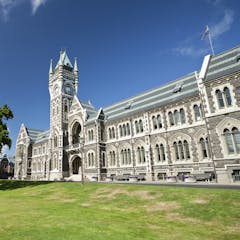
Articles on Research and development (R&D)
Displaying 1 - 20 of 114 articles

Canadians pay very high drug costs, but Canada also does not receive the same economic benefits from pharmaceutical industry investments as other countries do.

The $128 million funding boost for the tertiary sector is only a stop-gap measure. But it can buy time for a genuine rethink of the entire system.

The crisis in New Zealand universities is directly traceable to years of sustained underfunding and means they now lack vital research and development capacity.

Kenya’s budgetary allocation misses opportunities to improve basic education and address unemployment.

Commitments have been made to cybersecurity, defence and certain gaps in STEM education and workforce – but much remains to be seen this year once we review the national priorities.

The Medicines Patent Pool was created to promote public health, facilitating generic licensing for patented drugs that treat diseases predominantly affecting low- and middle-income countries.

Drug discovery research in Africa receives modest but essential international funding through philanthropic foundations and selected pharmaceutical companies.

Science is about more than crisis management – it’s about how we understand our present and future, and realise our potential as people

The male-dominated makeup of the industry partners who are meant to lead the commercialisation of research could undermine the work towards gender equity in Australian universities.

Australia has world-class research but low rates of research commercialisation by global standards. The scale and cultural focus of the government’s plan mean it could have an impact on this problem.

To attain a new health order, African governments need to bolster investment in research and development, innovation and manufacturing of health tools.

After years of government rhetoric about boosting the commercial benefits from university research, Australia’s record is still among the worst in the developed world.

An analysis by CSIRO’s strategic and economic advisory arm suggests spending on research and development can earn annual yields of 10%, even if there are delays or cost overruns.

Universities have long been developing research, talent and technology that, with the right mix of industry and government support, will allow Australia to emerge as a green export and R&D leader.

Many in the EU are wary of the motivations of Chinese companies investing in Europe. New research shows the many reasons behind these investments.

The type of deep-tech ventures behind mRNA vaccines are key to economic prosperity and sustainable development.

The US is generating more electricity than ever from wind and solar power – but often it’s not needed at the time it’s produced. Advanced energy storage technologies make that power available 24/7.

The COVID pandemic is giving drug companies an opportunity to reset their image. So how did they get so big and their credibility sink so low?

Stronger agricultural R&D systems will enable agriculture to power Africa’s transformation.

My new research shows Australia has spent more subsidising fossil fuel research indirectly via research and development tax credits than directly via grants.
